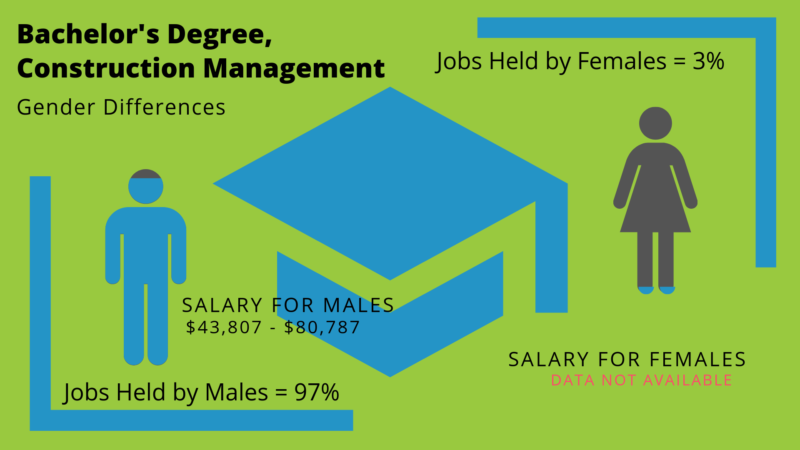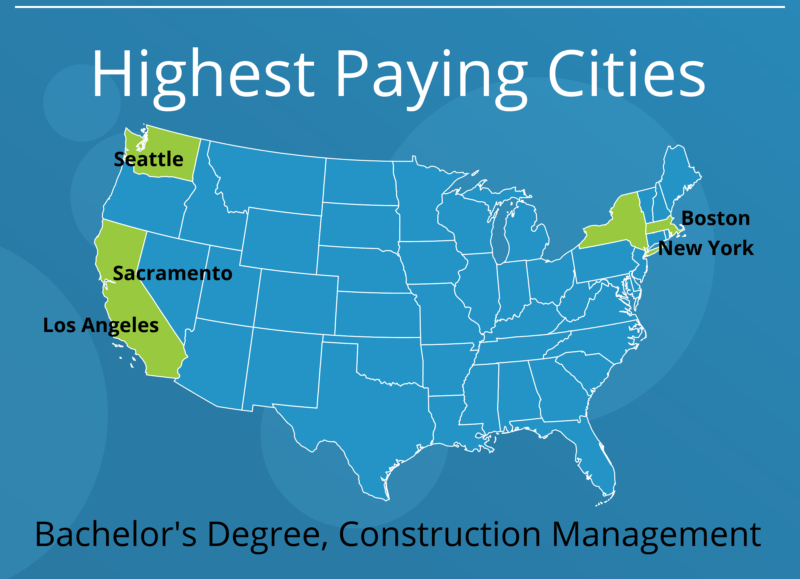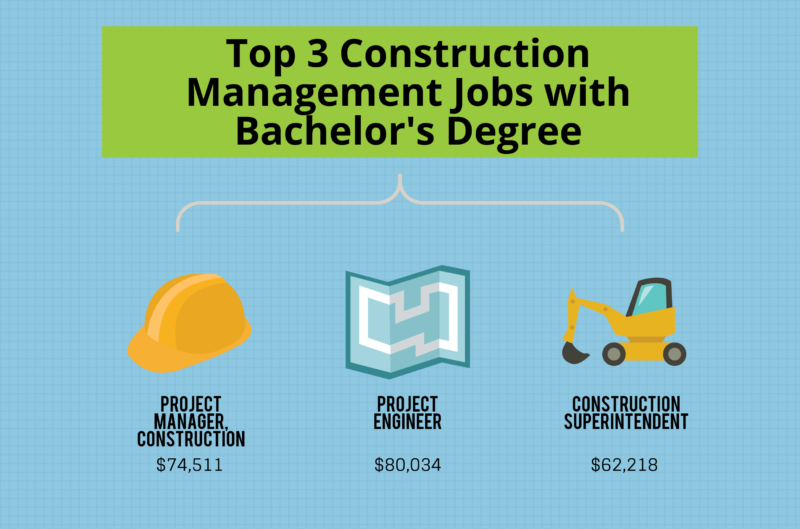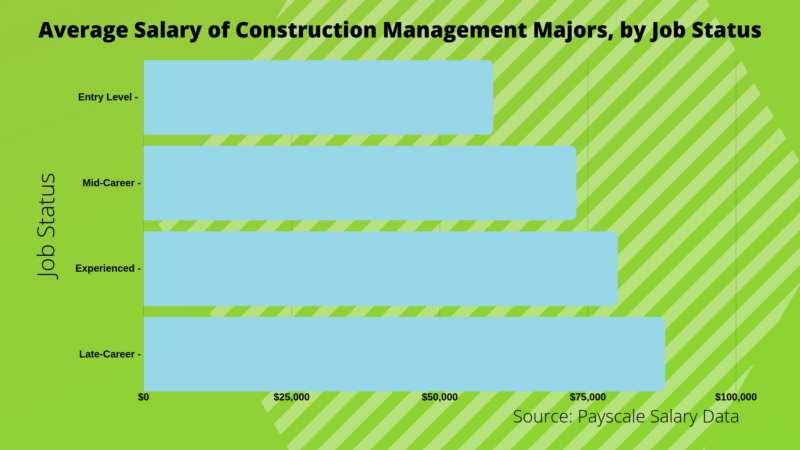Key Information:
- Graduates can work in various roles within the construction industry, including project management, cost estimation, and safety management.
- A construction management degree equips students with skills in project planning, budget management, and collaboration with different construction professionals.
- A degree in construction management can lead to rapid career advancement into senior roles due to the managerial and technical skills acquired.
In ancient Egypt, architects and engineers were the devotees of the demiurge Ptah and the goddess Seshat, and they were given the same status and respect as priests. That was a culture that valued construction. Modern America loves construction too, and for construction workers of all kinds, a step up into a construction management degree – well, it’s not quite a life of luxury, but it’s a living. What jobs can you get with a construction management degree? Construction encompasses numerous disciplines, activities, industries, and fields, so there is a lot of versatility to the title along with plenty of room for growth and advancement.
What Is Construction Management? What Do Construction Managers Do?
Just as the name implies, construction management involves managing construction projects from start to finish. Those management duties can include any or all of the varied duties that come with construction projects of any scope or scale. For example, a construction manager may need to assist with planning and coordinate different contractors or services.
The construction manager may also have to deal with the budget and collaborate with other professionals to keep the project on track and everybody on the same page.
Related:
The many duties a construction manager can take on can lead some to ask is construction management stressful. While construction management can come with numerous challenges, it is no more or less stressful than any other challenging but rewarding career field.

But, is construction management a good job? Is a construction management degree worth it? Construction management is indeed a good field full of good jobs. In addition, a construction management degree can put someone in a good position to run his or her own construction business or service.
Even without the degree, it is possible to achieve construction manager status from experience alone. However, that path is reserved for people who started in construction early and built a business from their skills after many years of experience. Nevertheless, the degree helps to open doors, establish connections, and find more work with employers.
In addition, the degree programs include real management training, which can help someone elevate far faster and earn more money in the industry, even when just starting out. Jobs for construction management degrees are many. So, for those with a passion for construction, and even those already in the field, gaining the construction management degree only helps in every way.
How to Get Into Construction Management
For those who want to know how to get into construction management, the answer is education. Jobs for construction management degree holders favor those with both experience and education. Many construction management degree programs aim to place students immediately following graduation. However, students can also work in any of the numerous construction trades even before graduation to rack up experience.
As stated, it is possible to find a way into construction management without a degree. Rather, that was true in the past, but these days, a bachelor’s degree is often expected as a minimum. Some avenues towards construction management also exist through the business route. Someone with a business major and a construction-related minor can often position themselves into one aspect of construction management or another. The most effective way though, is through a degree program and later, through certifications.
What Are the Best Construction Management Degree Schools or Programs?
When searching for a school, college, university, or program, the best way to figure out which school will work best is to start with accreditation. The accreditation status of a school or program will tell an applicant a lot. When it comes to accreditation, applicants need to know about regional accreditation as well as accreditation from the national or specialized accreditation groups.
Regional Accreditation
Regional accreditation comes from the regional accrediting agencies the Department of Education recognizes for setting standards that thousands of colleges and universities adhere to. An institution with regional accreditation will generally have a good academic program, and sometimes even a prestigious one. However, regional accreditation alone is not always a good indicator of if a particular school is the right fit for an applicant.
Even though regional accreditation is the most popular type of accreditation, other forms of accreditation exist as well. Regional accreditation groups give institutional accreditation, meaning the college or university as a whole meets quality standards. This does not necessarily mean the individual tracts or degree programs within the school are all the best. For example, an excellent university overall may still have a somewhat subpar construction management degree program.
Students who receive credits from a regionally accredited school can usually transfer those credits to just about any other school or program without a problem. Another consideration is that many of the schools with regional accreditation will typically have a more scholarly approach to academics, rather than a practical or applied one.
That approach can benefit a student in certain construction fields, but the majority of the construction industry appreciates practical knowledge over theoretical knowledge. The academic approach is not the same across the board.
Applicants should not shy away from a regionally accredited school because they think it will not give them the tools to get out there and start working immediately. The Ivory Tower isn’t what it used to be, and many regional universities are more focused on getting the people of their region into careers than on high-minded theory. Applicants should always pay close attention to the school or program’s curriculum before making a decision.
Specialized Accreditations
Specialized accreditation falls into the category of national accreditation. This means the accrediting agency oversees standards across the country, and sometimes even internationally. In many cases, specialized accreditations can trump regional accreditations, depending on the reach and makeup of the accrediting group.
With specialized accreditation, there is almost a guarantee the program will have a heavy focus on practical coursework and skill development for the current state of the industry. National accrediting agencies can also have official recognition from the US Department of Education. That means they adhere to or exceed the standards set by the DoE.
For construction management degree programs, specialized accreditation can come from one or more groups. The major accrediting agencies for these programs include:
- Accreditation Board for Engineering and Technology (ABET)
- American Council for Construction Education (ACCE)
- Association to Advance Collegiate Schools of Business (AACSB)
- Association of Technology, Management, and Applied Engineering (ATMAE)
Other accrediting groups exist as well for construction programs. Nevertheless, ABET accreditation is generally regarded by many as the preeminent accrediting organization for construction management programs. ABET accreditation has the recognition of many large organizations, government entities, and even state licensing boards. ACCE accreditation also receives some recognition.
Applicants can also find programs that have several accreditations from various construction or construction-related organizations. Business school accreditation also exists, as the construction management degree also requires several business class credits. Business school accreditation can work well for applicants who know they want to focus more on the business management side of a construction management career.

What Are the Different Types of Construction Management Degrees?
Construction management is a very diverse field, which means a bachelor’s in construction management can come from numerous types of construction programs. For example, applicants can pursue a BS construction management degree through a business school program. Equally, a BS construction management degree can come from an engineering or applied sciences program.
As the construction field is rife with specializations, many other paths can lead to a construction management degree as well. Because of the diverse paths available towards the construction management degree, it is important for applicants to put heavy consideration into what they plan to do once they achieve their degree.
Someone who wants to develop a plot of land and someone who wants to run an engineering firm will need different academic paths, even though both those paths will still lead to a bachelor’s in construction management. Colleges with construction management degrees can vary in their offerings.
Accreditation can help with this, as accredited programs, colleges, and universities must stick closely to the guidelines, standards, and academic expectations established by the accrediting organization. The standards set by the accrediting organizations typically produce graduates ready for the current state of the construction industry.
In this way, despite the types of construction degrees, the graduate will still have the education and knowledge to navigate whichever vertical of the construction management field they choose. Still, applicants should pay attention to the types of construction degrees any particular institution offers.
Colleges with construction management degrees and construction business management courses can lead to specializations in specific areas of construction. Specializations can include things like architecture, engineering, and even things like philosophy.
A note about engineering: there is a difference between construction engineering vs civil engineering. Colleges with construction management degrees may have courses that overlap between the different types of engineering, but it helps to understand the differences. Construction engineering is just another term for construction management.
Construction manager classes aim to produce a graduate who understands project management, planning, and design. In contrast, a civil engineer will have an education that helps them understand load-bearing structures, building codes, analysis, and the technicalities of different building techniques.
If deciding between construction engineering vs civil engineering, applicants will have to consider if they want construction manager classes that lead to a construction management bachelor’s, or if they would rather seek a bachelor’s in civil engineering. The construction management degree cost is comparable, so it all depends on the applicant’s goals.
Another consideration for types of construction management degrees is the construction management certificate vs degree question. As this industry puts a premium on experience, it is possible for someone with years of experience to gain a certificate only. Still, the industry in its current form favors those who hold a degree, certification, and have experience. When it comes to a construction management certificate vs degree, applicants should make sure they have both.
In a construction management program, you will learn:
construction estimating
construction science
construction process
construction site development
construction technology
A good program will also emphasize communication skills, because working with subcontractors on a job site can make the difference between successful building projects and failure.
Of course, construction companies will also want to know what construction experience you have. If you haven’t worked in construction, internships with construction firms can provide connections to get you there.
Earning a Construction Management Degree Online
People who search for “construction management degree near me,” or “construction management classes near me,” may find they are not close to any of the schools or programs. Nevertheless, it is possible, and sometimes advisable, to pursue an online construction management degree.
Earning a construction management degree online comes with all the same considerations as searching for a brick-and-mortar college or university. All the same rules apply. An online construction management degree program will still need applicants to vet the program and check the construction management degree online accredited status.
A fully online program can still apply for and receive an accredited online construction management degree program status. An online construction management degree from an accredited program is equal in the industry to a degree from anywhere else.
In some cases, a distance learning construction management program can help offer some flexibility that traditional college or university programs cannot. Taking a construction management course online can often fit around the student’s schedule, rather than the student sacrificing their work or responsibilities to attend the course.
Because distance learning construction management programs can offer flexibility, applicants need to make sure they understand the choice they make when they settle on taking a construction management course online.
For example, an accelerated online construction management program may seem ideal, but the applicant may not have the time to put the effort into finishing the course in the time frame. Flexibility comes with responsibility, and applicants need to remain aware of that.
The internet also comes with other construction management learning benefits. Applicants can find free construction management courses online. Finding construction management courses online free can help someone brush up on their knowledge or see if they are ready for more advanced classes.
These free options rarely come with any kind of credit, but they do sometimes offer a certificate. It never hurts to have more certifications. Applicants can also pursue a construction management certificate online from more recognized and prestigious organizations, business, or vendors.
In fact, it is possible to earn a construction management certificate online before, during, and after attending a degree program. These free construction management courses online and certificate opportunities can add weight and value to a resume or portfolio. Finding construction management courses online free of charge is not difficult.

What are the Relevant Certifications and Licenses for Construction Management?
Construction management certification is important. More now than ever, the industry wants its construction managers to hold notable certifications. Numerous types of certifications exist in construction. For construction managers specifically, there are a few certifications that stand out above the rest. A few of the relevant certifications include:
- CMAA certification (CMTI and CCM)
- OSHA construction safety certifications
- Project Management Professional certification (PMP)
Graduates will find there is a possible certification available for every type of job, tool, piece of technology, and software program they utilize. Construction management certification of various types can help a graduate be more competitive and edge out the competition. The CMAA certification is a gold standard in the industry, so pursuing at least that certification should represent a priority.
Applicants can find certification programs at schools and other facilities, but it is just as possible to pursue construction certifications online. Many free construction certifications online exist as well, typically through free construction management courses.
Although free construction certifications online can have some benefit, applicants should really look out for those certifications that will give them their best chance, such as the construction safety certifications. Options for construction management certification online can help those who are not close to schools or universities with the needed certification courses.
When it comes to licensing, the laws vary by state, job type, and whether the work occurs on public or private property. With so many factors involved, applicants should always make themselves aware of the licensing laws for construction projects where they plan to work.
What Are the Different Careers in Construction Management?
Are you wondering, “What can I do with a construction management degree?” As a very diverse field, careers in construction management and jobs with a construction management degree can vary widely. To start with, the construction manager job description itself is rather open. In many cases, the construction manager job description is written by the construction manager.
Generally speaking, construction management roles can entail:
- General contracting
- Project coordination
- Project management
- Resource management
- Building construction
A job in construction management can include all these things, just some, or even just one of them. Even while serving those construction management roles, a construction manager does not always have to fully take on all the duties.
For example, resource management can include material costs, labor costs, scheduling, and many other duties. However, it is just as possible for a construction manager to only handle some of those or only play the point person for directing others to handle those duties.
The more the construction manager does and can do, the more valuable that person becomes. A job in construction management can mean any of a number of things, and careers in construction management can transform over time.
Some construction management degree jobs and career paths can include:
- Building Surveyor
- Building services engineer
- Construction manager
- Environmental engineer
- Facilities manager
- Project engineer
- Project manager
- Site engineer
- Sustainability consultant
- Town planner
- Urban designer
- Cost estimators
- Construction project manager
For construction management jobs entry-level positions can also vary. Depending on location, job seekers may find numerous management opportunities open to them as construction management jobs entry-level positions. Elsewhere, the entry-level construction management degree jobs will look more like operations specialists, assistant positions, property inspectors, and lower-tier technicians.
If you don’t know what to do with a construction management degree, keep in mind that job titles in construction management have an important role. Construction job title hierarchy is a real thing, and the job titles in construction management can change depending on the careers with a construction management degree the construction manager takes on.
For example, the title of senior construction manager can represent the highest tier in the construction job title hierarchy. Yet, a construction manager without that senior designation can sit at the middle level of the hierarchy.
These titles are important for a number of reasons, and they can affect every part of the construction manager’s duties. If the construction manager plays the role of site manager for a particular job, then the CM will be just a site manager, with all that entails.

What Are the Salary Expectations for Construction Managers?
Construction manager salary, on average, is around $77k according to the Bureau of Labor Statistics (BLS). The range of salaries stretches from around $50k to $120k. The BLS puts the average pay rate at $93k across the country. Despite these variations on construction manager salary, they all point to the position being a lucrative one that only earns graduates more over time and with increased experience.
Construction management degree salary will depend on several factors. Jobs in construction management salary will depend on location, experience, education, certifications, and the market for construction projects in that particular area. Construction management degree salary can also vary widely even in the same locations. Construction management vs civil engineering salary shows that construction management edges ahead.
Still, jobs in construction management salary remain lucrative and are growing. Specializations also help to grow the construction management salary. Construction management technology salary is also worth considering. The technology used in the construction fields continues to grow just like the technology used everywhere else.
This growth creates a demand for construction managers that are tech-savvy and understand how to apply technology to construction problems. For these reasons the construction management technology salary keeps in lockstep with the construction industry in general.
Are There any Professional Organizations in Construction Management?
With an industry as encompassing and diverse as construction, there are certainly a tremendous number of professional organizations. Some well-known construction management organizations include:
- American Institute of Constructors
- Associated Builders and Contractors
- Associated General Contractors of America
- Construction Management Association of America
This is by no means an exhaustive list of construction management organizations. The Construction Management Association of America (CMAA) is one of the more popular of the construction management organizations. It is worth noting that the CMAA is also the lead member society of the ABET. This means CMAA is directly involved with crafting the criteria for programs and students with ABET accreditation.
Other construction management associations can exist at the local level. Construction management graduates with specialties can likely find professional organizations that cater to that particular specialty.
Professional organizations can add a lot of value to anyone’s construction management career. These organizations tend to consist of professionals at every level of the industry. Through organizations, it is possible to network, find new opportunities, and get industry news first.
The networking opportunities alone are worth the price of admission. Professional organizations tend to know about career advancement and relevant job opportunities before anyone else. In fact, job creators tend to make up the membership of many professional construction management organizations.
